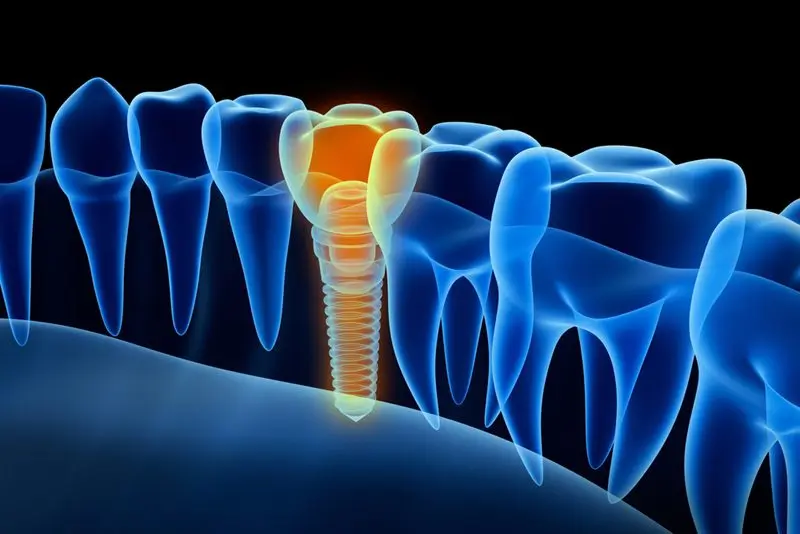A dental implant is one method used by dentists to replace missing teeth. It commonly involves the use of a post, held in place with a screw, to replace the role of the root in holding the crown of the tooth in place. Both parts are made of titanium.
What are the benefits of a dental implant over other methods?
Missing teeth are replaced by dentists whenever possible because a gap can cause a number of issues in the mouth. A space can allow nearby teeth to move towards it, cause an uneven bite, create more room for bacterial growth and cause facial distortion.
Other ways of replacing a missing tooth, or several teeth, include having a dental bridge or dentures. The benefit of dental implants is that they are well fixed to the jawbone, which makes them stable when eating and talking, and unlikely to come loose over time. The operation does not affect any of the surrounding teeth, as is the case with dental bridges. It is also a very sturdy option which makes it a good long term replacement when compared to dentures which may need replacing after a few years.
It is usually hard to distinguish between a real tooth and a dental implant.

What type of dental implant will be used?
At City Dentists we use a type of implant known as endosteal. Endosteal implants involve planting a titanium screw directly into the jawbone. With such a sturdy base for the screw, there is little chance it will become loose or move around. In fact, as it heals after surgery, the original jawbone will grow around the implant, securing it in place and further increasing stability.
The procedure is carried out in two parts. In the first appointment, the implant is inserted into the jawbone and allowed to embed. The second procedure involves making and attaching the dental crown to the implant.
Improving the jawbone
If a patient doesn't have a strong enough jawbone to take the implant, there a number of ways to strengthen the bone. Methods which may be employed include bone augmentation, sinus lift, or ridge expansion, which involves a bone graft to widen the top of the jaw.
Other surgeries sometimes turn to mini implants as another option for those patients without sufficient jawbone. Mini implants are smaller than conventional ones and don't go as deep into the jawbone. While this can make for a quicker procedure, it can also lead to a lack of stability and a lower tolerance of bite which means they may be more susceptible to breaking or mishaping. Overall, mini implants are considered to have a higher rate of failure than standard implants which means many dentists still avoid using them.
It is also important that the patient takes care of oral hygiene and makes regular visits to the dentist.
Caring for dental implants
The healing process can take a number of days and is dependent on the individual patient. It is also important that the patient takes care of oral hygiene and makes regular visits to the dentist following the surgery. Assuming that mouth hygiene is adequately maintained, implants can last a considerable number of years, possibly even a lifetime.
City Dentists will provide thorough information regarding the care of your dental implant once the procedure is complete. Contact us today on 04 9784 964 or book an appointment online to get your treatment underway.
